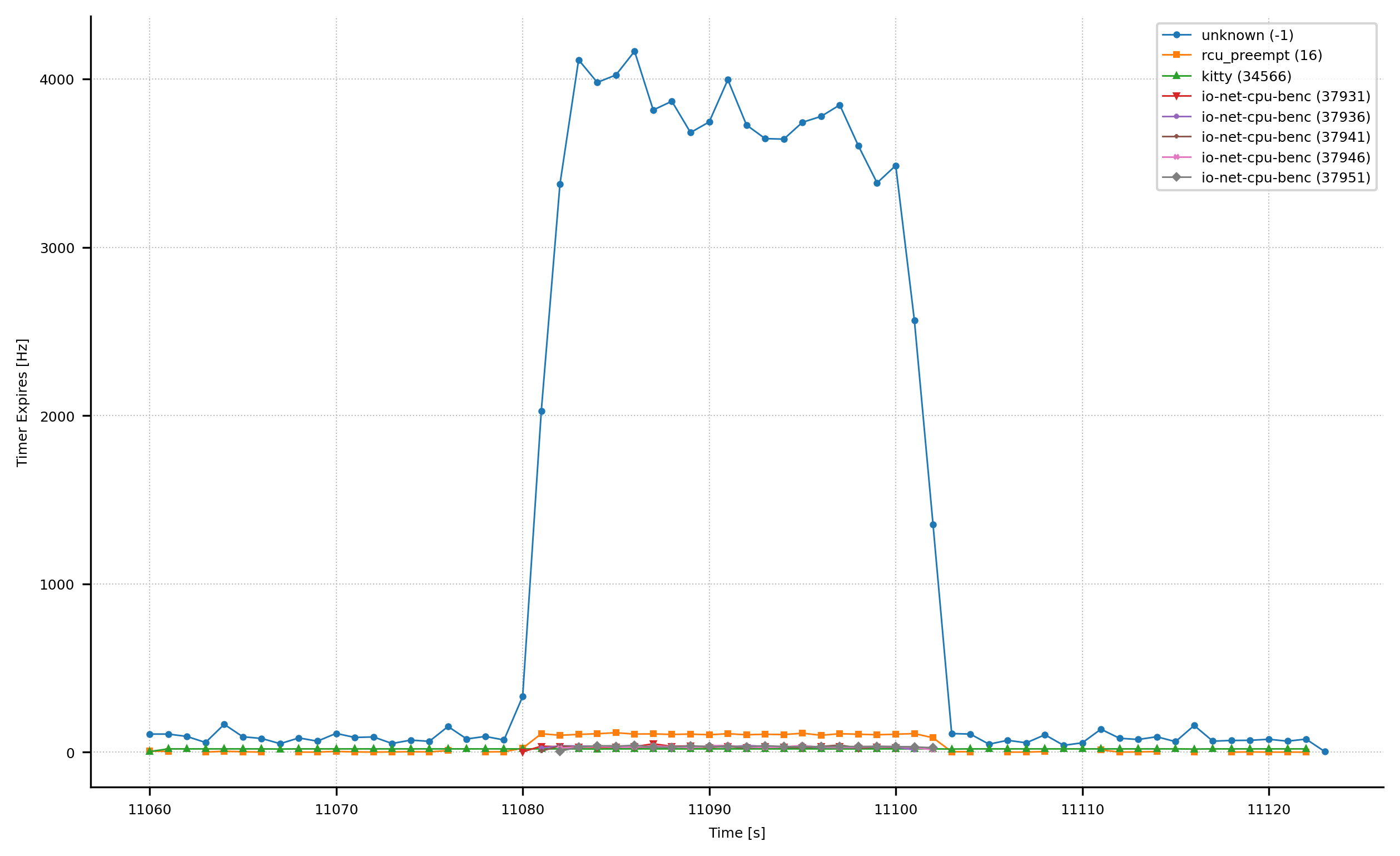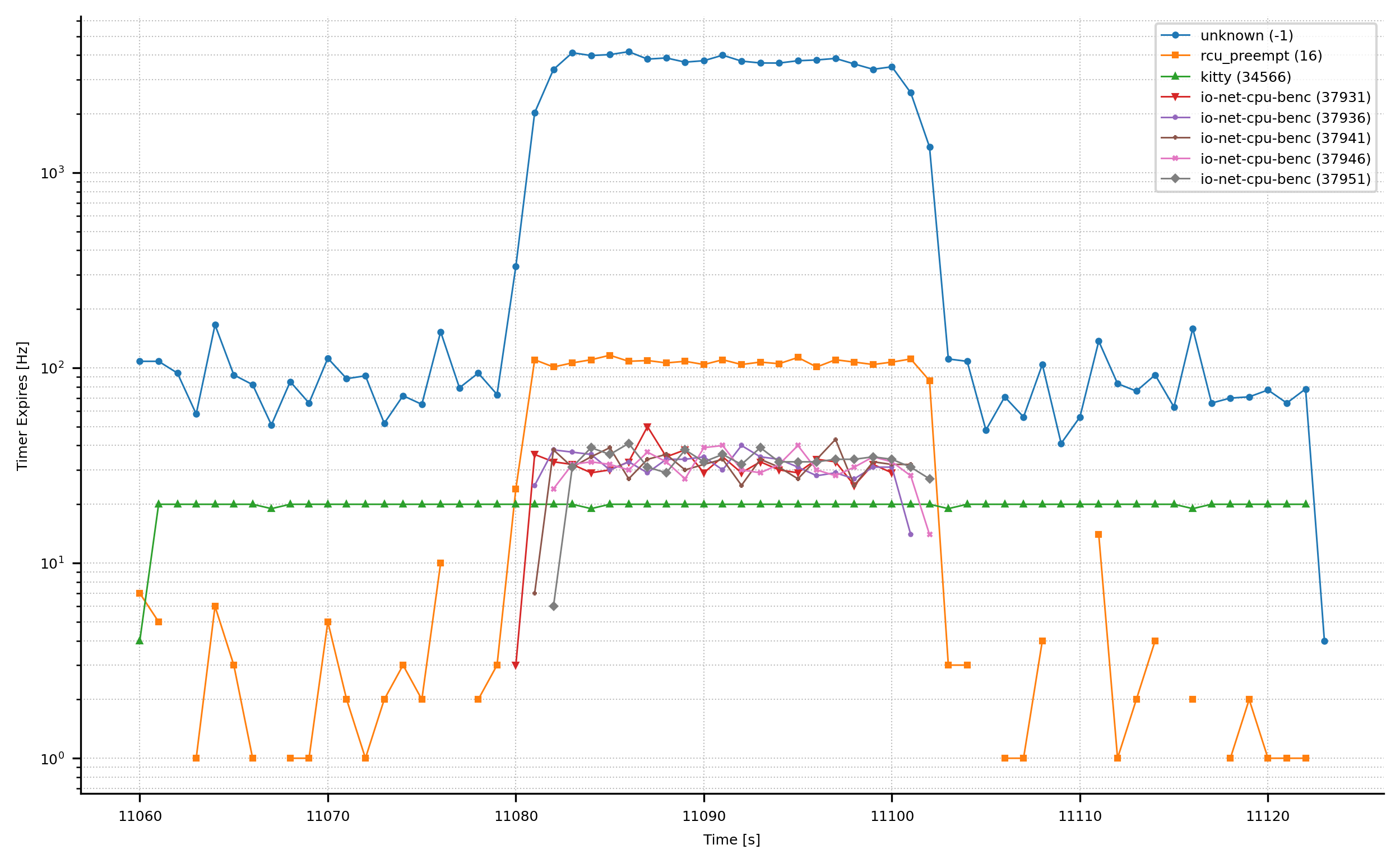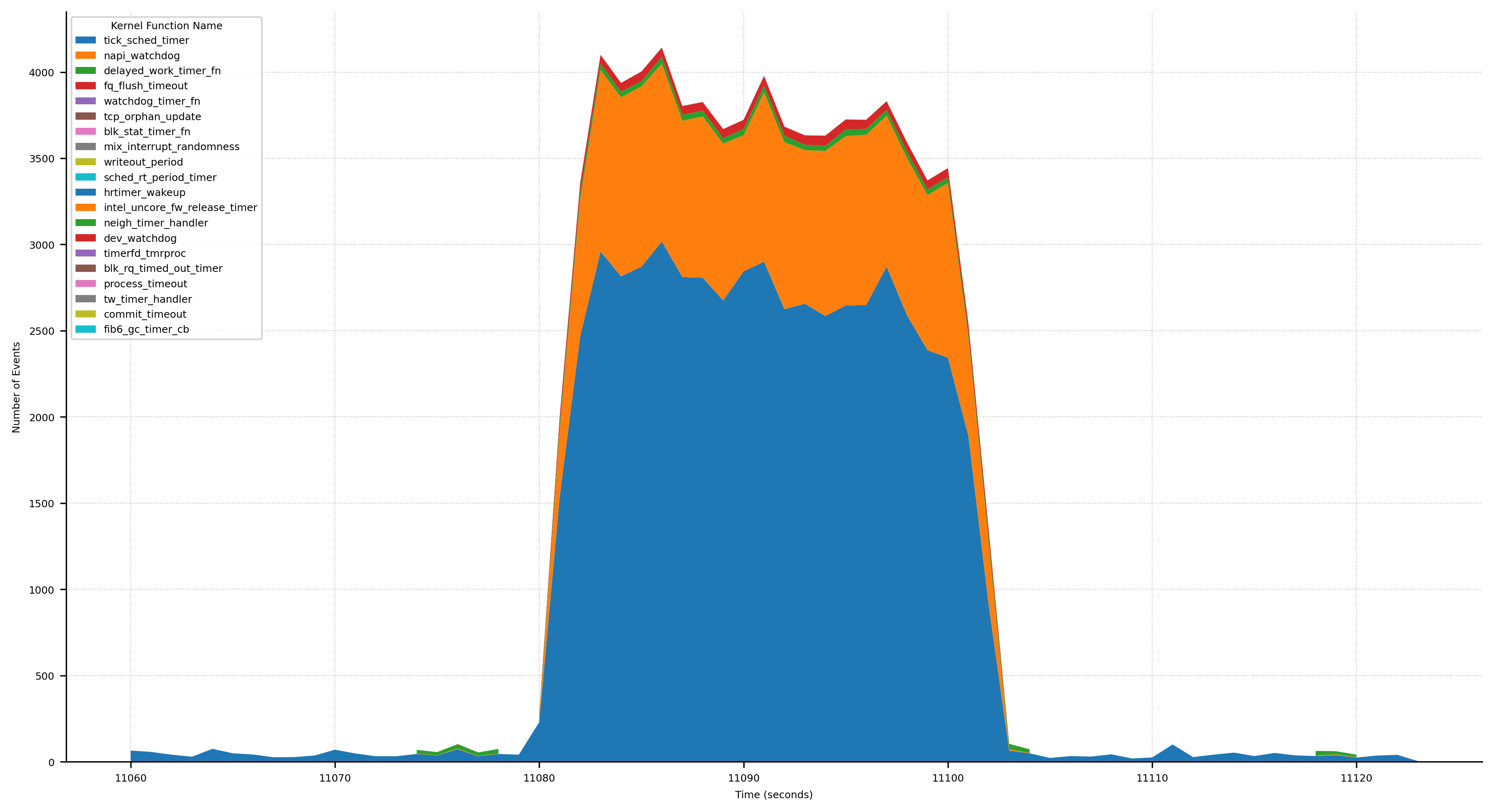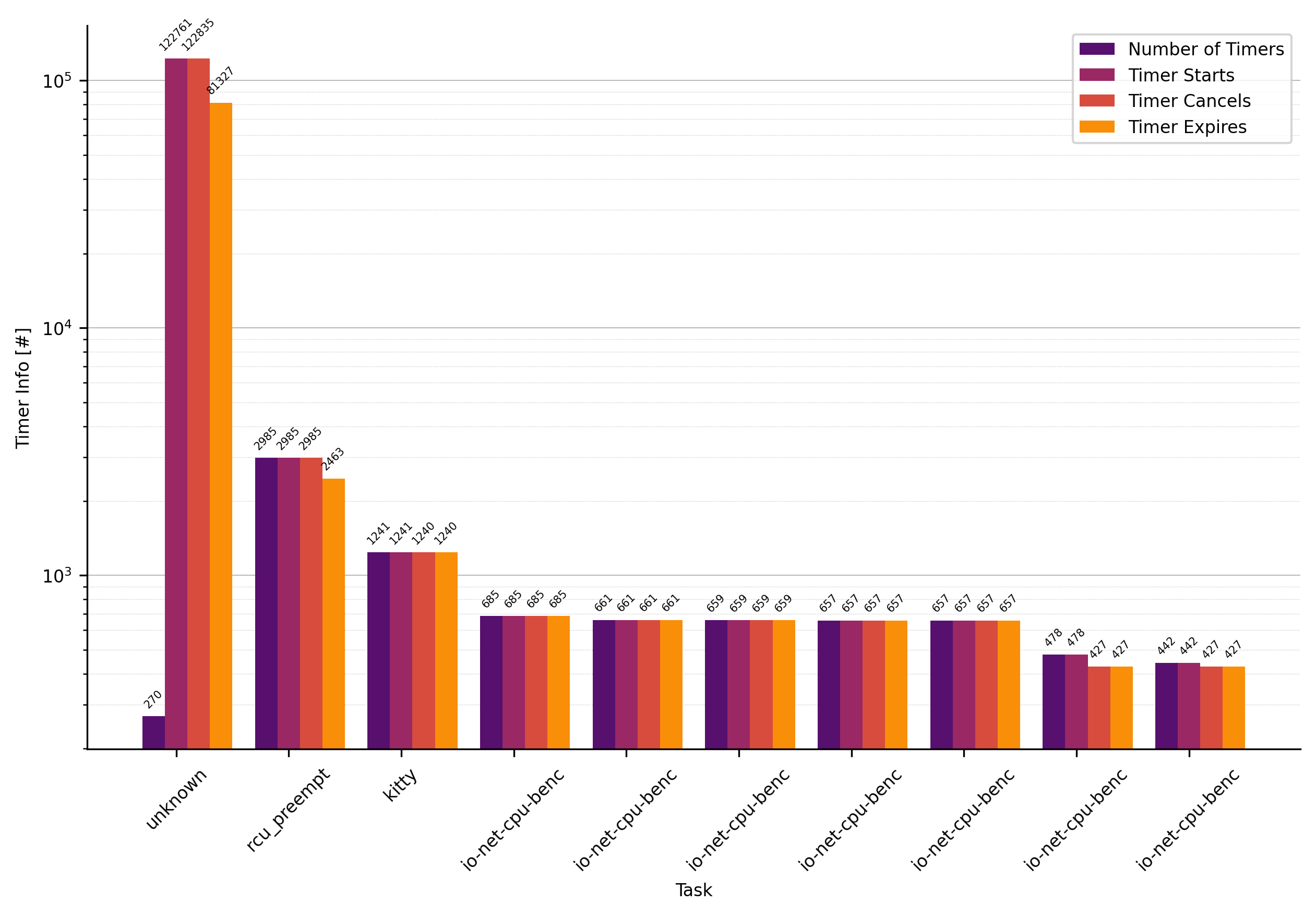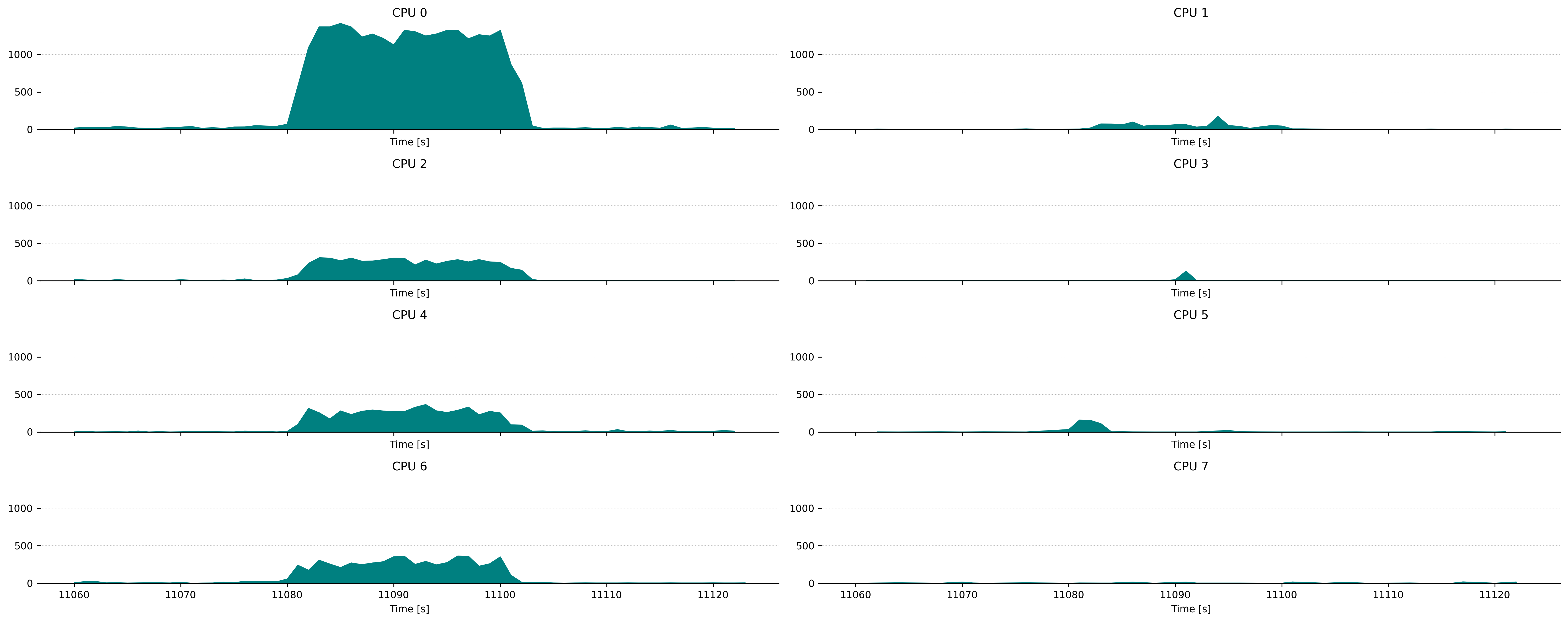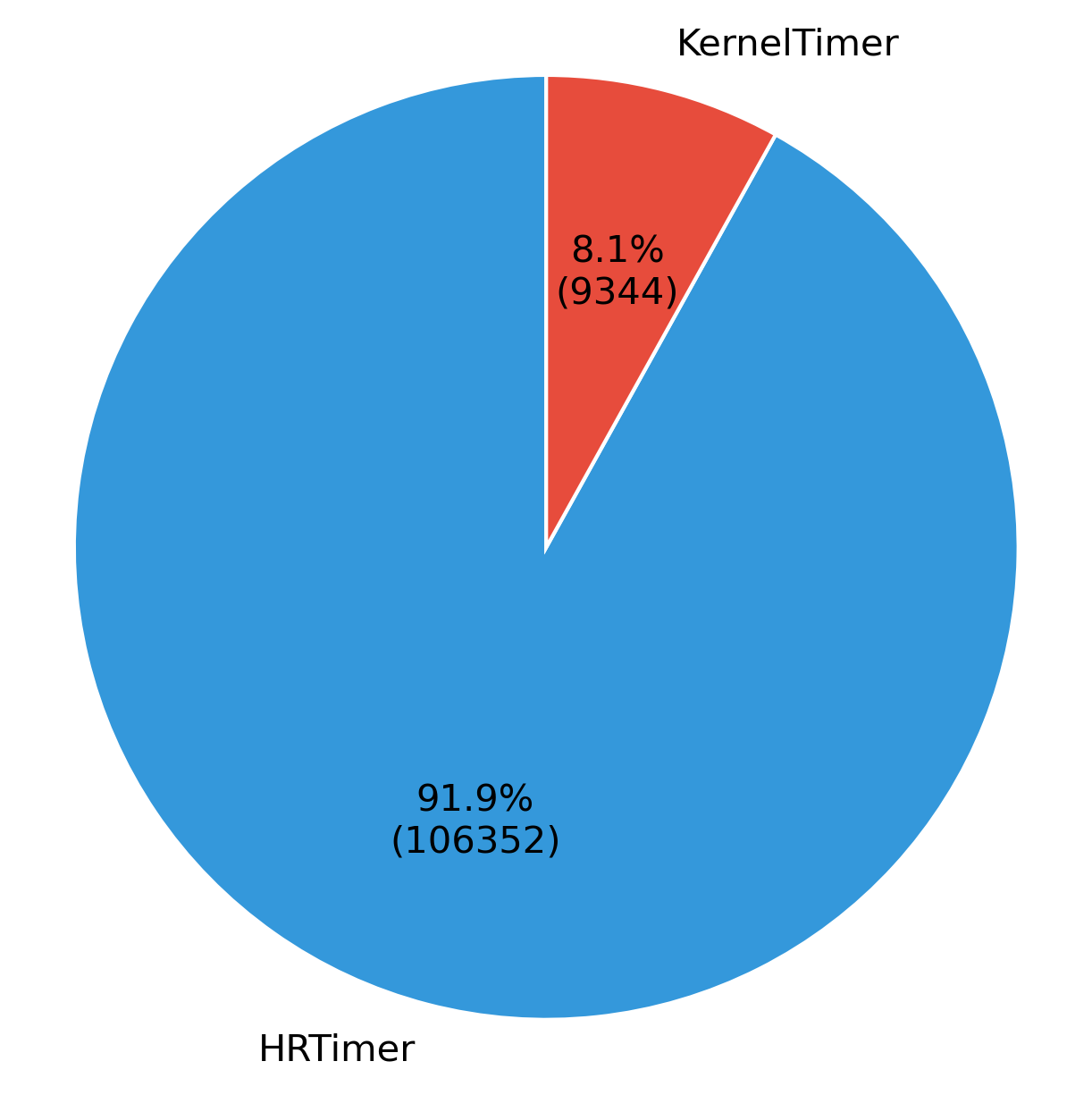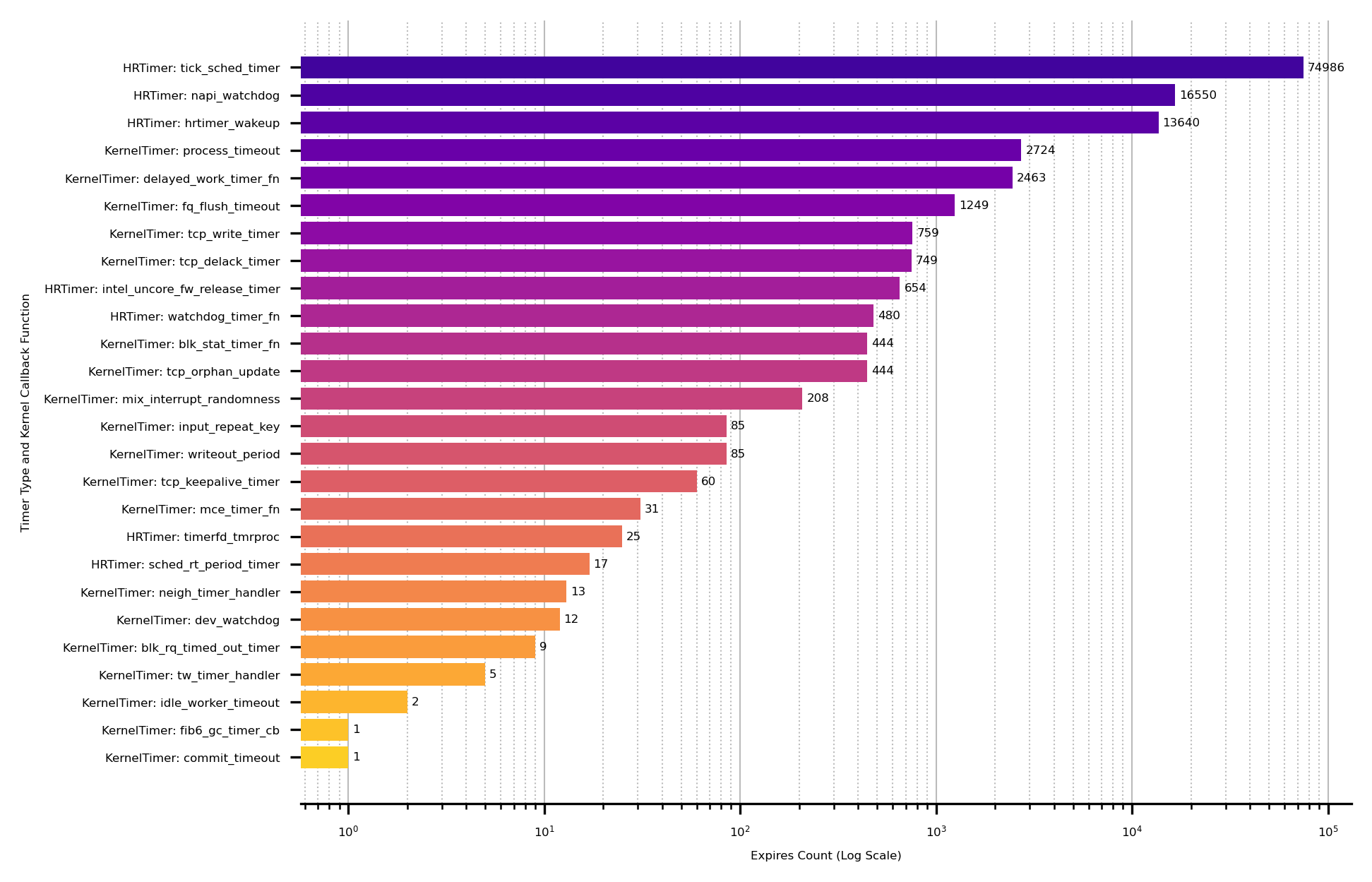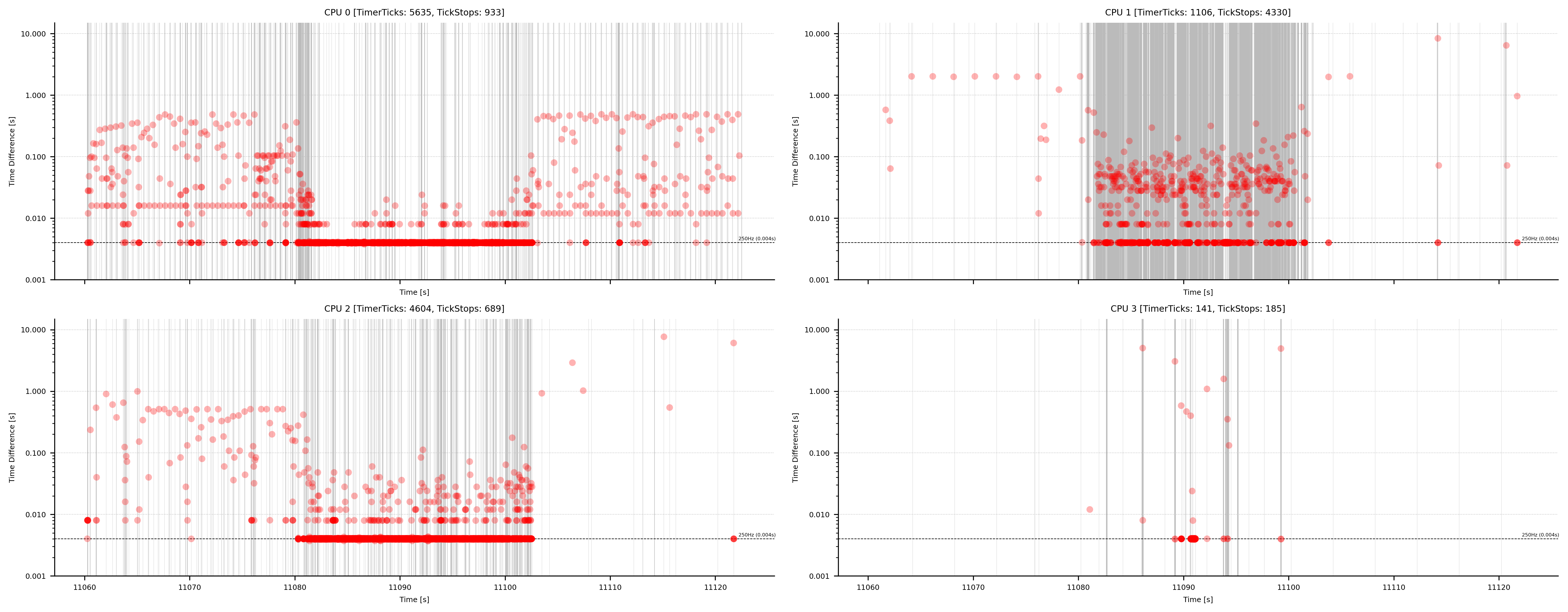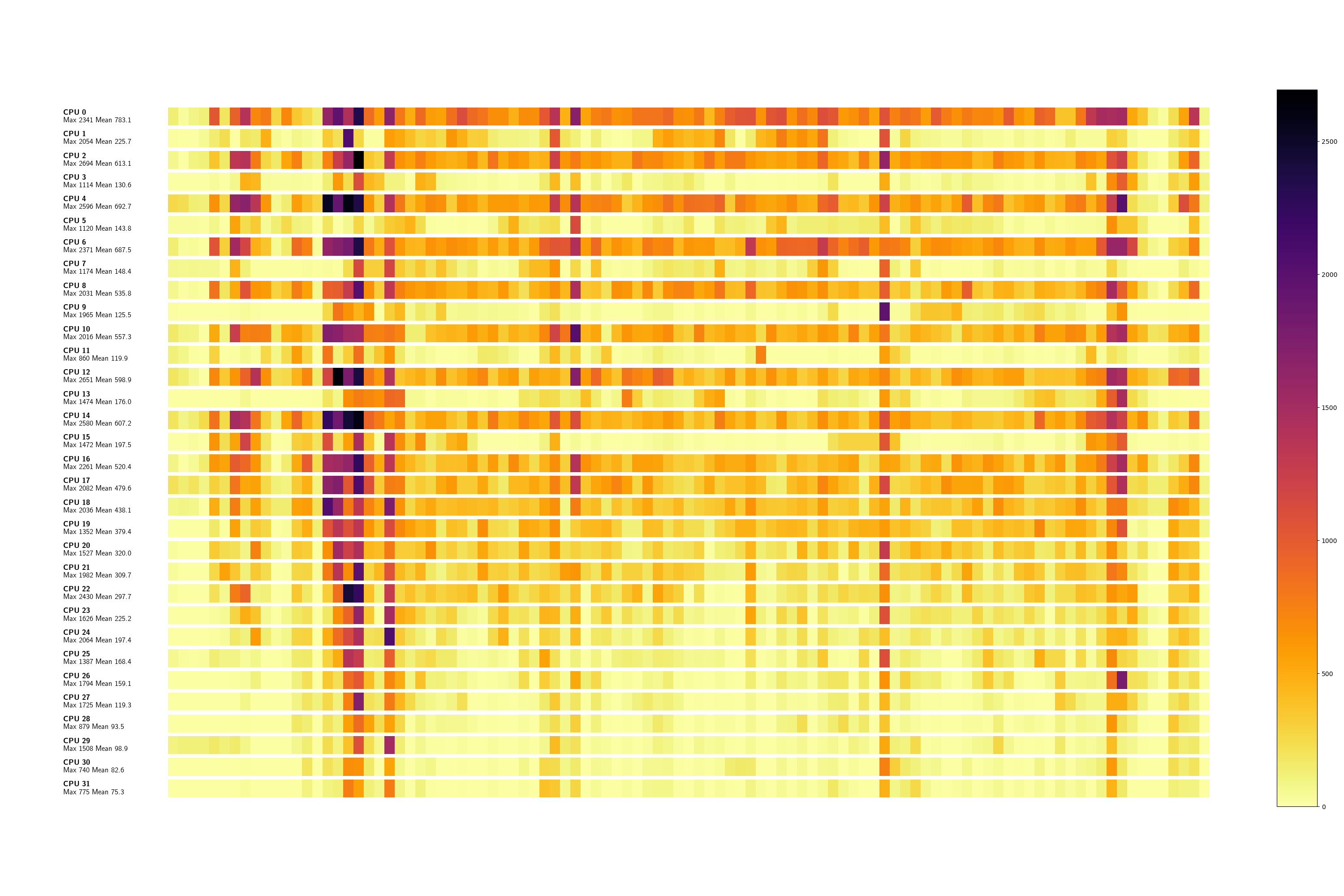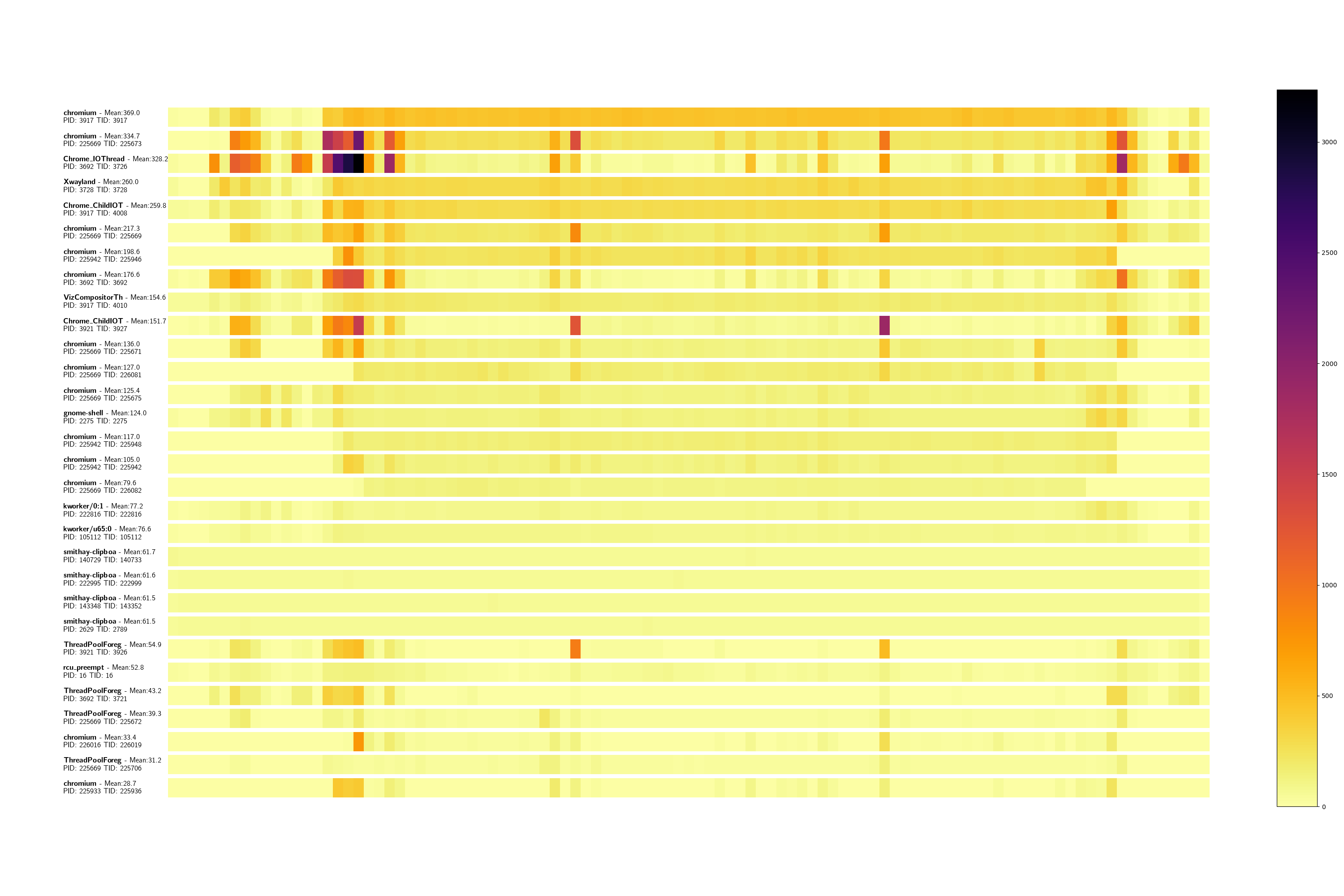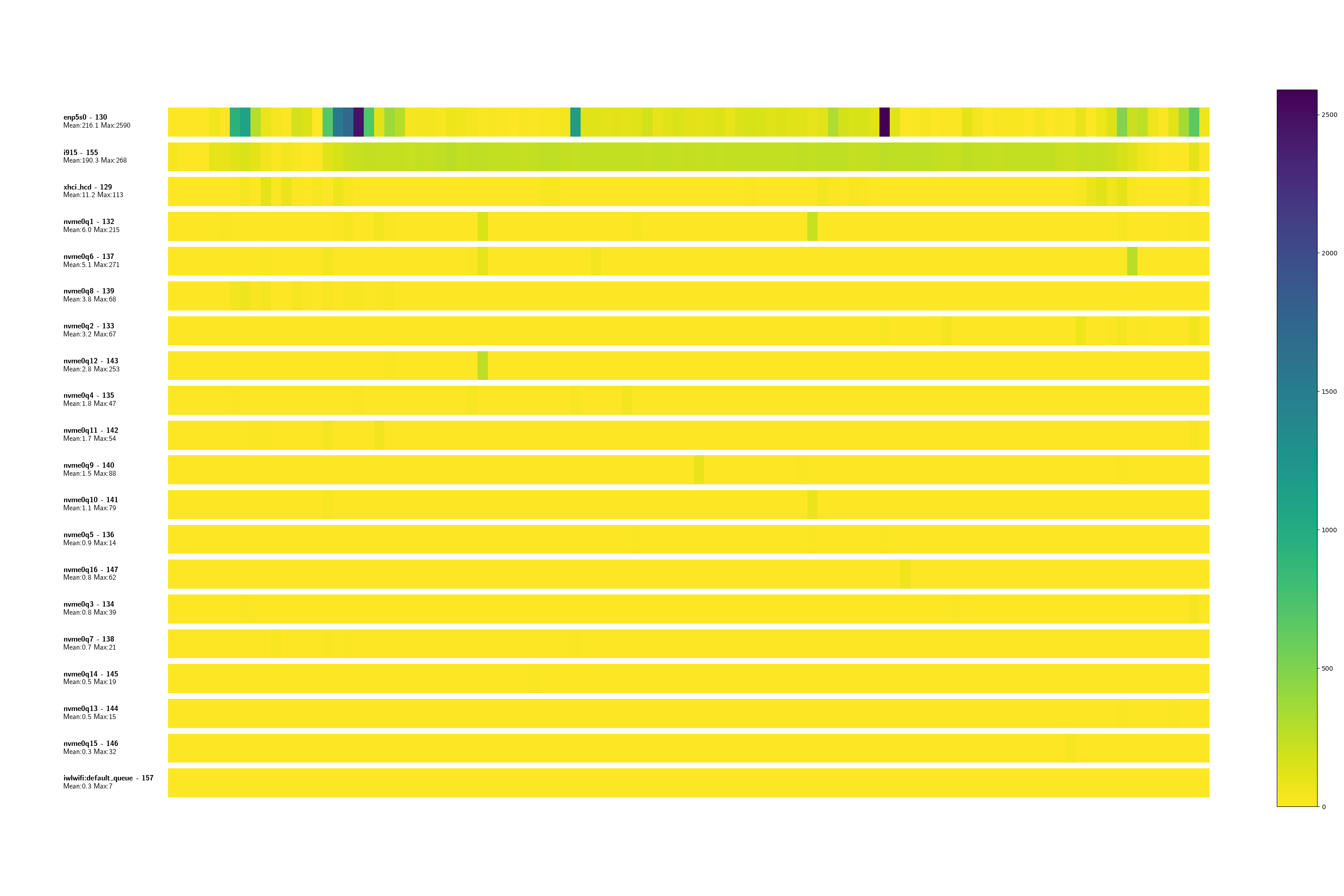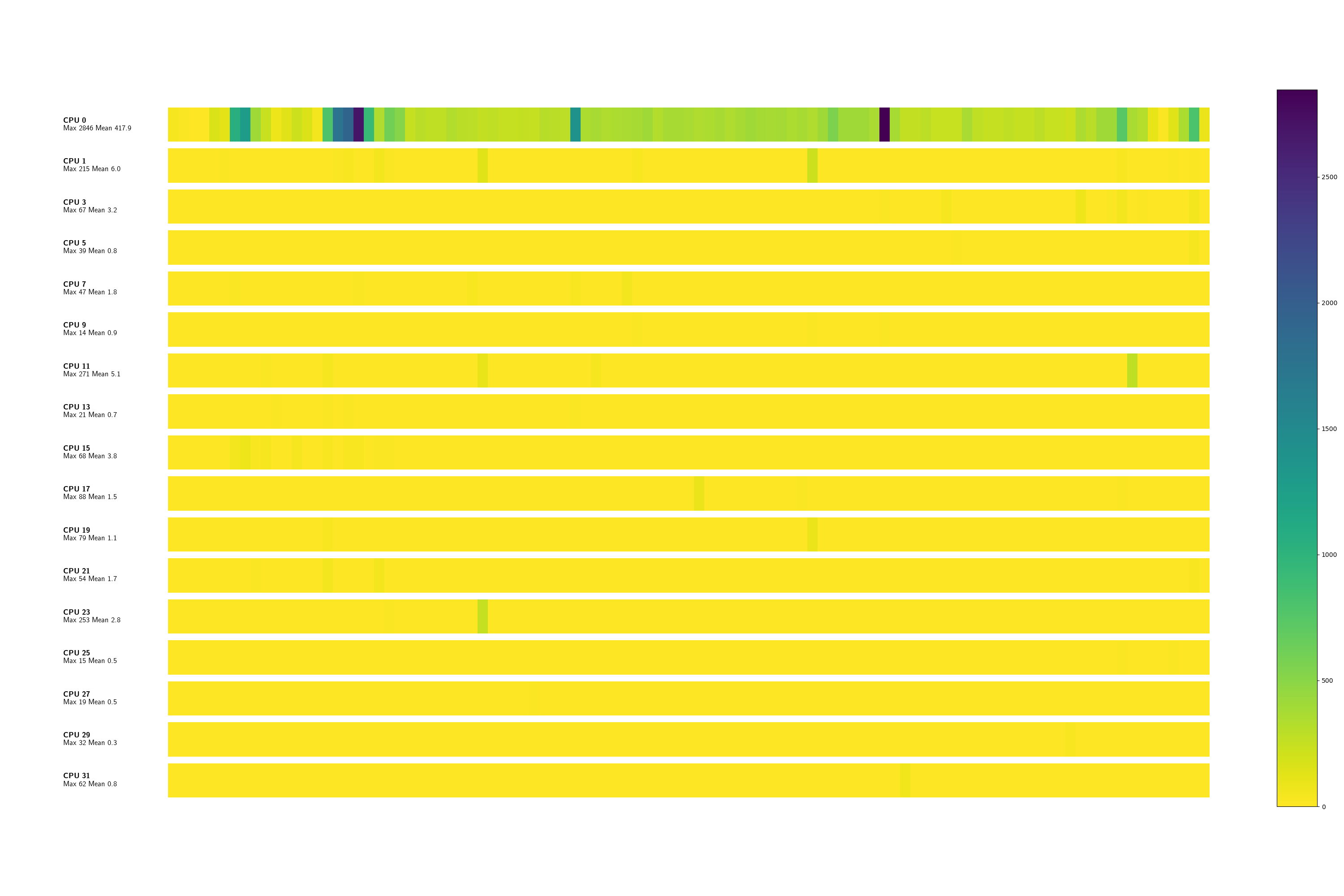The perf power statistic script try to fill the gap between applications like powertop who provides high level insights about power management crucial characteristics and complete manual analysis of power relevant subsystems with the goal to optimize whole systems.
This perf script extract the most relevant Power Management data from the kernel and present it in a module-specific and understandable form. Additionally, the data created is explicitly designed to be passed on to specialized analysis scripts in order to obtain more detailed and graphical analyses. Nevertheless, many modules already provide a very detailed insight, just by looking at them, without you having to go any deeper.
Many analyses at this level require a deep understanding of the Linux Kernel and its processes - unfortunately, the script cannot compensate for this.
This documentation try to explain the functionality of the perf power statistic script, the outputed data and how the data can be interpreted to help the reader to do their own power management analysis. Furthermore, this documentation provides a lot of post-processing scripts to further analyse the data provided by the kernel and the perf power statistics script. To generate these charts for your particular use cases, often just two commands are required.
Perf power-statistics provide the functionality via so called modules. Each module focus on one particular analyze and can be called separately.
Suppord modules are:
- idle-cluster
- task
- timer
- frequency
- summary
- all (not a real module, it just enabling all other modules)
Based on this, each module often output several different analysis. For
example, the timer module provide information about timer type-callback
characteristics as well as time series of all expired timers. These different
outputs are called analyzer.
Recording can be done be the provided perf wrapper to collect all required events. The provided wrapper is just a handy shortcut to test everything. Because power-management do so many different analyses a bunch of events are required. This quickly leads to huge amounts of recorded data. For longer and specific analyses, e.g. when using one module, it is beneficial to record just the required events.
In the documentation of each module the required events are listed. This helps to reduce the recorded events to a minimum.
Note: power-analyzer are written in a robust way, if events are missing for a particular module it will just not work and output anything.
Standard output for the modules focus on readability and the outputed
information can be processes by a human. Some modules provides more insights,
more raw values. This provided data must be forwarded into post-processing
chains (see next section). The output of these analyzer is prevented by
default. To enable additional analyzer, the option --extended is available.
Note: extended do not extend the data by adding additional columns to the data. Extending means additional analyzer are enabled.
power-statistics is written in a way that the collected data can be post processed by other tools as well. Data will then be read from Python for Visualization with matplotlib, forecaster like sktime or other tools. For this power-statistics was designed that all data can be reliable and easily processed.
One important option that all modules implement is --file-out. If enabled,
all output is written in dedicated files, named like the particular analyzer,
e.g. timer-type-callback-expiration.txt.
These files are guaranteed parseable and CSV valid. So it number of column do
not change depending on the data. In contrast to CSV the delimiter is not a
comma or semicolon, it is just whitespaces. So to read the data it is easy as
pd.read_csv(FILE_PATH, delim_whitespace=True) (pandas dataframe).
The files, generated by --file-out begin with the name of the module. So for
example, the timer module generates some analysis, so that the files are always
pre-fixed with timer-...: write data to timer-.. timer-task-info.txt,
timer-type-callback-expiration.txt and timer-expires.txt
Via -C <n> or --cpu <n> it is possible to restrict the output to one CPU.
However, it is important to note that not all commands understand this option.
The often better alternative is to specify a CPU when recording, if this is
possible, for example because processes have been pinned to a specific CPU with
taskset.
perf script power-statistics.py -- --mode wakeups-timesequence -C 1
Sometimes the option is even dangerous. For example, in the timer analysis
due to task migrations, recurring timer may be moved from one CPU to another.
If the filtering limits the analysis of a particular timer then the analyzation
will not see the hrtimer_init event.
Each module has independend requirements if CPU filtering is risky or if even required. This will be elucidate in the description of each module.
perf power-statistics provides several modules, they can be queried via
$ perf script -i /tmp/perf.out -s ~/src/code/linux/tools/perf/scripts/python/power-statistics.py -- --mode help
usage: power-statistics.py [-h] [-m [{idle-cluster,task,timer,frequency,summary,all}]] [-C CPU] [-v] [--highlight-tasks HIGHLIGHT_TASKS] [--stdio-color {always,never,auto}] [--csv]
power-statistics.py: error: argument -m/--mode: invalid choice: 'help' (choose from 'idle-cluster', 'task', 'timer', 'frequency', 'summary', 'all')
Subsequent sections describe all modules in detail and how to post-process the data
Required events: ...
The recorded data length is 60 seconds. The first 20 seconds is on a nearly idle Gnome desktop system. After 20 seconds chromium is started and a bunch of website are visited, this for again 20 seconds. Afterwards, no further browser interaction are done - the system slowly calms down.
- Output Filename:
timer-expires.txt - Required Evemts
- timer:hrtimer_init
- timer:hrtimer_start
- timer:hrtimer_expire_entry
- timer:hrtimer_cancel
- timer:timer_init
- timer:timer_start
- timer:timer_expire_entry
- timer:timer_cancel
- Extended Mode (
--extended)
Output Data:
Time PID Comm CPU TimerType Now StartSoftExpire StartExpire Function
286620.187660809 152123 ThreadPoolForeg 11 HRTimer 286629470151692 286629470099466 286629470149466 hrtimer_wakeup
286620.188537133 152124 ThreadPoolForeg 4 HRTimer 286629471022978 286629470919418 286629470969418 hrtimer_wakeup
286620.193581325 -1 unknown 10 HRTimer 286629476066745 286629476000000 286629476000000 tick_sched_timer
286620.193599137 -1 unknown 10 KernelTimer 4366549652 4366549651 4366549651 blk_stat_timer_fn
286620.197588773 -1 unknown 9 HRTimer 286629480072777 286629480000000 286629480000000 tick_sched_timer
286620.197606219 -1 unknown 9 KernelTimer 4366549653 4366549652 4366549652 delayed_work_timer_fn
286620.201196138 86127 kitty 27 HRTimer 286629483678969 286629483543653 286629483593653 hrtimer_wakeup
286620.215074830 150947 sleep 4 HRTimer 286629497561008 286629497454283 286629497504283 hrtimer_wakeup
286620.217582137 -1 unknown 23 HRTimer 286629500067923 286629500000000 286629500000000 tick_sched_timer
[...]
The most obvious analysis is the number of expired timers, i.e. timers that have not been stopped prematurely, but which have actually expired and will trigger an action. The following illustration shows all expired timers of all CPUs and summarises them at process level. As a large number of processes trigger a timer during 100 seconds or recording, the visualisation script has a limit that can be set so that processes with fewer expired timers are not displayed; this limit is set here at 400.
The large number of timers in the unknown process is eye-catching. This unknown class contains timers that were started by the kernel and/or where no assignment to a userspace process is possible.
The next image illustrate the same data but with a logarithmic scale for y-axis. The following picture becomes immediately apparent: many Chromium-based processes become executable after 20 seconds. You can also see that Kitty (GPU based terminal emulator) causes a constant timer load per terminal, two terminals are executed.
The use of a logarithmic scale makes more data visible and is advantageous for many analyses.
Now let's zoom into the "unknown" area. So kernel-specific timers and break this down. What are the different timers for, what do they do? For this analysis it is necessary that kallsyms-mapper.py (see appendix) was called to exchange kernel addresses for the function name. For the analysis we use a stack graph, the number of timers per second is accumulated.
The following is nice to see:
- at second 20, the timer ticks increase massively. These are by far the most
frequent source of executed timers. Also easy to recognise. The kernel is
configured with 250Hz, i.e. a maximum of 250 timers can strike per core
(multiplied by the number of cores, we get the maximum timer ticks per second
for the entire system). In the first 20 seconds you can also see very clearly
that
CONFIG_NO_HZ_FULL - large number of network stack relevant timers can be recognised, especially NAPI handling and also TCP state machine relevant timers.
- remaining timer expires are common timers, triggered more often because of more overall processing.
Info: even if we see a lot of timers here, this does not necessarily mean that this is the source of unfavourable power management behaviour. In periods of 20 seconds to 40 seconds the system is at 100% processing for some cores. Timers do not wake up the system or contribute negatively to power efficiency. Or in other words: long and deep sleep phases are not possible in the period from 20 to 40 seconds for capacity utilisation reasons.
- Output Filename:
timer-task-info.txt - Required Evemts
- timer:hrtimer_init
- timer:hrtimer_start
- timer:hrtimer_expire_entry
- timer:hrtimer_cancel
- timer:timer_init
- timer:timer_start
- timer:timer_expire_entry
- timer:timer_cancel
Output Format:
Comm PID Timers Starts Cancels Expires Expires[Hz] CPUs
unknown -1 270 122761 122835 81327 1306.364 0,1,2,3,4,5,6,7,8,9,10,11,12,13,14,15,16,17,18,19,20,21,22,23,24,25,26,27,28,29,30,31
rcu_preempt 16 2985 2985 2985 2463 39.563 0,1,2,4,6,8,10,12,14,16,17,18,19,20,24,25
kitty 34566 1241 1241 1240 1240 19.918 6,8,16,18,20
io-net-cpu-benc 37951 685 685 685 685 11.003 0,2,4,6,8,10,12,14,16,17,18,19,20
io-net-cpu-benc 37936 661 661 661 661 10.618 0,2,4,6,8,10,12,14,16,17,18,19
gmain 2644 10045 10045 10045 240 3.855 0,22,23
io-net-cpu-benc 37947 2138 1554 1549 230 3.695 0,1,2,3,4,6,8,10,12,14
io-net-cpu-benc 37937 2147 1576 1563 229 3.678 0,2,4,6,8,10,12,14,16
gnome-shell 2404 843 837 830 143 2.297 0,2,4,6,8,9,10,12,14,16,17,20
kitty 4204 684 684 683 134 2.152 0,2,4,6,8,10,12,14,16,17,18,19,20
kcompactd0 247 122 122 121 121 1.944 0,2,4,6,8,10,16
atopacctd 999 106 106 105 105 1.687 26
perf 37927 62 62 61 61 0.980 13
avahi-daemon 23584 119 119 118 42 0.675 0,2,18,4
khungtaskd 244 1 1 0 0 0.000 17
systemd 1 1 1 0 0 0.000 1
[...]
- Output Filename:
timer-task.txt - Required Evemts
- timer:hrtimer_init
- timer:hrtimer_expire_entry
- timer:timer_init
- timer:timer_expire_entry
Output Format:
Comm PID Timers Starts Cancels Expires Expires[Hz] CPUs
unknown -1 270 122761 122835 81327 1306.364 0,1,2,3,4,5,6,7,8,9,10,11,12,13,14,15,16,17,18,19,20,21,22,23,24,25,26,27,28,29,30,31
rcu_preempt 16 2985 2985 2985 2463 39.563 0,1,2,4,6,8,10,12,14,16,17,18,19,20,24,25
kitty 34566 1241 1241 1240 1240 19.918 6,8,16,18,20
io-net-cpu-benc 37951 685 685 685 685 11.003 0,2,4,6,8,10,12,14,16,17,18,19,20
io-net-cpu-benc 37936 661 661 661 661 10.618 0,2,4,6,8,10,12,14,16,17,18,19
gmain 2644 10045 10045 10045 240 3.855 0,22,23
io-net-cpu-benc 37947 2138 1554 1549 230 3.695 0,1,2,3,4,6,8,10,12,14
io-net-cpu-benc 37937 2147 1576 1563 229 3.678 0,2,4,6,8,10,12,14,16
gnome-shell 2404 843 837 830 143 2.297 0,2,4,6,8,9,10,12,14,16,17,20
kitty 4204 684 684 683 134 2.152 0,2,4,6,8,10,12,14,16,17,18,19,20
kcompactd0 247 122 122 121 121 1.944 0,2,4,6,8,10,16
atopacctd 999 106 106 105 105 1.687 26
perf 37927 62 62 61 61 0.980 13
avahi-daemon 23584 119 119 118 42 0.675 0,2,18,4
khungtaskd 244 1 1 0 0 0.000 17
systemd 1 1 1 0 0 0.000 1
[...]
- Output Filename:
timer-type-callback-expiration.txt - Required Evemts
- timer:hrtimer_init
- timer:hrtimer_start
- timer:hrtimer_expire_entry
- timer:hrtimer_cancel
- timer:timer_init
- timer:timer_start
- timer:timer_expire_entry
- timer:timer_cancel
Output Format:
TimerType Callback Expires
HRTimer tick_sched_timer 57782
HRTimer napi_watchdog 19404
HRTimer hrtimer_wakeup 10300
HRTimer watchdog_timer_fn 504
HRTimer sched_rt_period_timer 26
HRTimer intel_uncore_fw_release_timer 20
HRTimer timerfd_tmrproc 10
HRTimer it_real_fn 1
KernelTimer process_timeout 2594
KernelTimer delayed_work_timer_fn 1662
KernelTimer fq_flush_timeout 1206
KernelTimer tcp_write_timer 493
KernelTimer tcp_orphan_update 350
KernelTimer tcp_delack_timer 258
[...]
Tip: see Appendix (Kernel Address to Kernel Function Name Mapping) to map these addresses to kernel function names.
- Output Filename:
timer-tick-info.png - Required Evemts
- timer:hrtimer_expire_entry
- timer:tick_stop
Output Format:
Time CPU Event Success Dependency Kernel-Function
11060.263109719 25 TICK_STOP 1 0 None
11060.263174075 2 EXPIRE_ENTRY -1 None tick_sched_timer
11060.263174239 8 EXPIRE_ENTRY -1 None tick_sched_timer
11060.263182312 26 TICK_STOP 1 0 None
11060.267187041 0 TICK_STOP 1 0 None
11060.267187678 2 EXPIRE_ENTRY -1 None process_timeout
11060.267189072 31 EXPIRE_ENTRY -1 None tick_sched_timer
[...]
Required events: sched_switch
Show on a per process and thread basis the wakeups for every second. This analyse can be used to get an idea about periods where a process triggers many wakeups vs. periods of a task where only a few wakeups are triggered.
These data can be used to visualize the data to provide a human overview.
Note: process wakeups are not the only way to wake up a CPU core from a sleep phase. Interrupts also lead to a change to a C0 status. But: the analysis at process/thread level allows the easiest intervention, as the execution control is in the hands of the developer - this is not the case with IRQs that occur asynchronously.
The following picture shows a nearly idle system, only a wild process, which is always migrated to different cores by the scheduler, generates a constantly high wakeup load.
The following illustration show the exact same data, but with a focus on a task level. Here the former crazy task - a clipboard process gone wild - which asks for clipboard data much too eagerly, causes a high wakeup load.
Some analysis benefits from providing the function name instead of illustrating
the raw kernel address. For example: in the timer analysis the internal
callback functions are recorded. But addresses like ffffffffb6da37c0 are not
that helpful for the user. To map these kernel addresses to function names a
generic mapping script is provided in the assets directory. This script simple
iterates over stdout replaces all matches with the function name - here
tick_sched_timer- and print out everything else untouched to stdout.
# read from STDIN and pipe to STDOUT
$ sudo assets/kallsyms-mapper.py <timer-type-callback-expiration-bar.txt >tmp.txt
$ mv tmp.txt timer-type-callback-expiration-bar.txt
If the script is not executed with effective UID 0 a warning is printed on stderr.
Note: the replacement must be done on the recording systems to recording time. Especially on systems with activated Kernel Address Space Layout Randomization (KASLR) where positions of kernel code is pseudo-randomized at boot time.
